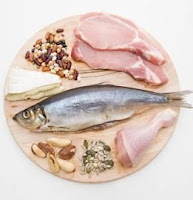
*stomach growl* Are you hungry? Wanna go grab something to eat now? Wait...what's your diet like? Are you eating the right foods? Today’s lesson is on “Food and Its Importance” as requested by one of my student. I hope he’ll be reading this post :) Alright, let’s just get right to it.
So the amount and type of food that we eat on a daily basis is very important to both health and performance. Food provides us the energy we need to do work, for growth, to build and repair damaged tissues, to keep us warm and helps our bodies to stay healthy. Not getting enough nutrients can lead to a variety of illnesses which shall be discussed later on.
The process of taking food into the body and using it for the living parts of the body is known as nutrition. There are 7 classes of food i.e.
1) Carbohydrates 2) Proteins 3) Fats 4)Fibre (Roughage)
5)Vitamins 6)Minerals 7)Water
1
All of the above food groups with the exception of water are nutrients.
1) Carbohydrates
Carbohydrates are the body’s main source of energy. We need energy for growth, movement and to keep us warm.
Carbohydrates can be classified into two types i.e. (i) Sugar (simple carbohydrate) and (ii) Starch (complex carbohydrate).
 Simple carbohydrates or simple sugars can be found in foods such as fruits, chocolates, cakes, fizzy drinks and milks. They can provide a lot of energy for immediate use, but does not contain other useful nutrients like in a lollipop.
Simple carbohydrates or simple sugars can be found in foods such as fruits, chocolates, cakes, fizzy drinks and milks. They can provide a lot of energy for immediate use, but does not contain other useful nutrients like in a lollipop.Complex carbohydrates or starches include rice, bread, potatoes, biscuits, pasta and cereals are good sources of energy. The body can easily store energy from carbohydrates for rapid use by the muscles. Starchy foods often also contain lots of useful vitamins, minerals and fibre.
However, eating too much carbohydrate can cause the excess glucose turns into fatty acids and be stored as body fat.
2) Proteins
Proteins are needed for growth and the repair of body tissues. They are also needed for the formation of enzymes, hormones, haemoglobin and antibodies.
Examples of foods rich in proteins are egg white, meat, fish, nuts and beans.
Lack of proteins in your diet can cause kwashiorkor. The physical examination may show an enlarged liver and abdomen. To prevent kwashiorkor, make sure your diet has enough carbohydrates, fat and protein.
3) Fats
Fats are also used for energy, but only when stores of carbohydrate run low. Fat contains more than twice as much energy as carbohydrates.
Fats are usually solids (e.g. butter, margarine and cheese). When the fat is liquid at room temperature, it is called oil. (e.g. cooking oil)
Eating too much fat may lead to obesity, which is unhealthy.
4) Fibre (roughage)
Fibre is also known as roughage which is made up of cellulose from plant cell walls. Fibre cannot be digested in our body. It holds a lot of water so that our faeces remains soft and can pass from our body easily.
Fibre helps to prevent constipation which is a difficulty in passing out faeces from our body as a result of lack in fibre which causes the faeces to become hard and dry.
Examples of dietary fibre are whole wheat and grain products, fruits and vegetables.
5) Vitamins
Vitamins are organic compounds needed in small amounts by our body for health and growth. A deficiency (lack) of vitamins will lead to certain diseases.
6) Minerals
Minerals are inorganic substances needed in small amounts by our body in order to stay healthy.
7) Water
Water makes up 70% of our body. It is the main components of our blood and body fluids. It is vitally important that you drink enough water.
Water carries substances around the body and helps to remove wastes. It is the medium for chemical reactions within the body.
Fluids include fresh water and all other liquids like fruit juice, soft drinks, coffee, tea, milk and soup.
Milk is a mixture of nutrients with water. A mother’s milk is the most suitable food for the new born babies. Mother’s milk contains all the necessary nutrients to feed the baby properly and it is rich in antibodies, which protect the baby against diseases.
Balanced diet
Everyone should try to eat a healthy, balanced diet. A balanced diet must contain all the 7 classes of foods (carbohydrate, protein, fat, fibre, vitamins, minerals and water) in the correct proportions. Each nutrient is needed for the proper functioning of the human body. The effects of not having a balanced diet can prove to be harmful to the body.













No comments:
Post a Comment